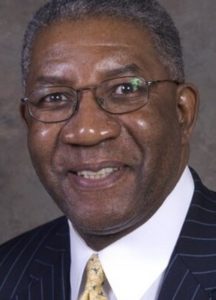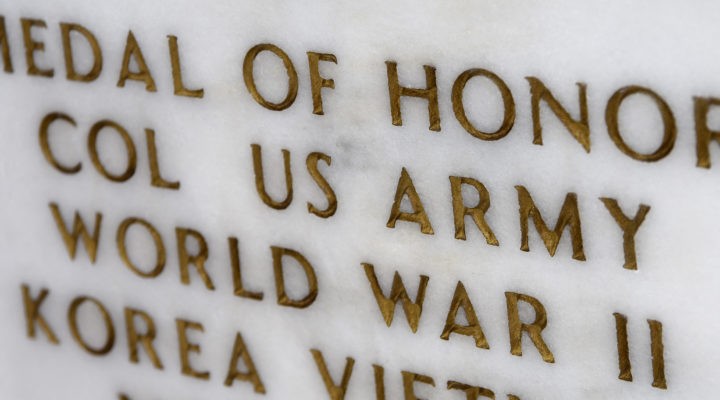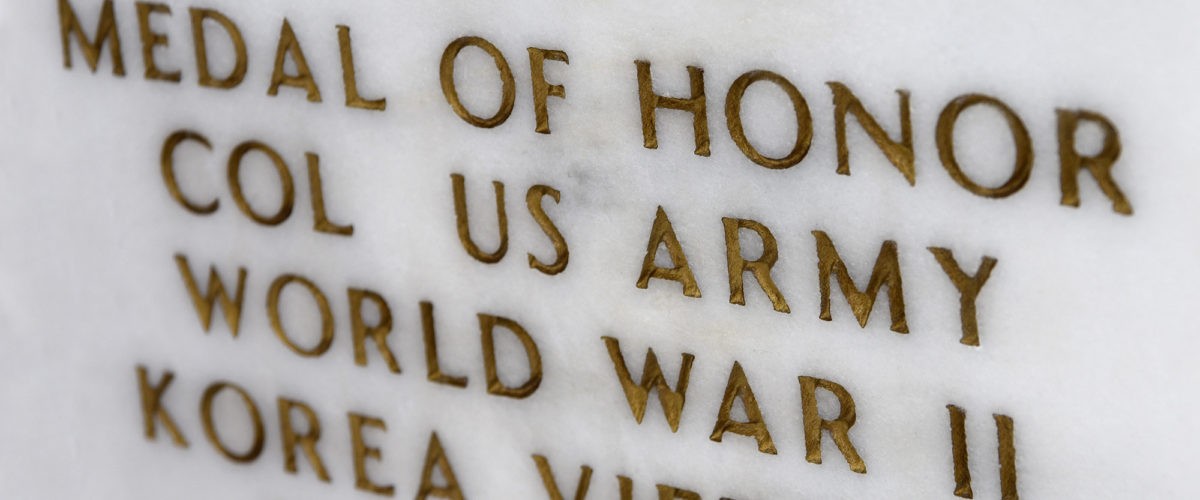Last week for Veterans Day, I was asked to address the Pulaski County Bar Association in Little Rock, Ark., as it recognized the sacrifice and service given by people who have served in the armed forces of the United States. I am a veteran. My father, father-in-law and several uncles and cousins were veterans. Veterans Day holds great meaning for me.
On May 12, 1973, I took the following oath: “I, Wendell Griffen, do solemnly swear that I will support and defend the Constitution of the United States against all enemies, foreign and domestic; that I will bear true faith and allegiance to the same; that I take this obligation freely, without any mental reservation or purpose of evasion; and that I will well and faithfully discharge the duties of the office on which I am about to enter. So help me God.”

Wendell Griffen
My father (who served in the Army during World War II) and my mother (who had a brother serve during World War II) watched me take that oath. I took it with men (there were no women in my ROTC classes at that time) who, like me, became Army and Air Force officers.
With our oaths, we pledged to support and defend the Constitution of the United States against all enemies, foreign and domestic. That is why I learned to parachute from planes at Fort Benning, Ga. That is why I learned to deploy field artillery weapons at Fort Sill, Okla. That is why I learned to keep my wits and crawl through obstacles while under live gunfire.
Not an oath to party or ideology
The oath people take when entering military service is not an oath to support and defend any political party. It is not an oath to support and defend any economic system, be it capitalism or any other. It is not an oath to support and defend any religion, be it whatever religion the oath-taker holds, another religion, or no religion. It is not an oath to support and defend any faction.
It is an oath to support and defend a set of values. One takes that oath believing that those values are worth supporting. One takes that oath believing those values are worth defending. One takes that oath knowing that those values do not support and protect themselves.
People support and defend the values of liberty and justice mentioned in the Constitution. People support and defend the values of representational democracy. People support and defend the values of checks and balances on governmental power. People support and defend the values of judicial review of legislative and executive actions. People support and defend the values of elections.
“The oath people take when entering military service is not an oath to support and defend any political party.”
The oath people take on entering military service is based on hard lessons across history that teach another truth. People must support and defend the values mentioned in the Constitution because those values are always subject to being undermined and attacked — get this — by enemies, foreign and domestic, who are people!
Duty, honor, valor
Let me speak with you about three things, basic to supporting and defending the Constitution, that people who enter military service are taught: Duty, honor, valor.
We learn that supporting and defending the values of liberty and justice outlined in our Constitution is a patriotic duty. A basic factor in fulfilling that duty involves knowing whether someone is an enemy to the Constitution. It is the age-old work people who pull sentry duty perform of recognizing whether someone is a friend or foe.
The enemy trying to undermine and overthrow the Constitution may be from a different society. However, the enemy may be someone who lives among us, even kin to us. The Civil War was fought by people who lived in the same society. People who had been friends — even schoolmates — took different sides.
Discerning the difference between friends and foes to liberty and justice is a fundamental duty that is drilled into and discharged by people who serve in the military. The people who watch sonar and radar systems are trying to detect whether objects on their screens are threats to be confronted and countered. People on foot patrols are watching their surroundings to detect whether others in their vicinity may be adversaries. Such vigilance and discernment are duties that cannot be neglected.
Honor means keeping faith with duty. The duty to support and defend the Constitution does not fulfill itself. It is only fulfilled by faithful service. Fidelity to that duty requires mental, physical, emotional, moral and materiel readiness. It requires knowledge about the strengths and vulnerabilities of allies and enemies.
 Valor is the third element needed to support and defend the Constitution. Valor involves courage to act during deadly situations, even at the risk of one’s life. It happens when a soldier throws herself on a live grenade. It happens when a medic runs to treat a wounded comrade in the thick of a battle. It happens when a unit fights to the death so that others can escape to fight another day. It is what happens when people look on situations involving danger, disaster and death, defy those risks, and honor duty. Because acts of valor involve such great and often irreparable risks, we should never be casual or flippant about sending people into harm’s way.
Valor is the third element needed to support and defend the Constitution. Valor involves courage to act during deadly situations, even at the risk of one’s life. It happens when a soldier throws herself on a live grenade. It happens when a medic runs to treat a wounded comrade in the thick of a battle. It happens when a unit fights to the death so that others can escape to fight another day. It is what happens when people look on situations involving danger, disaster and death, defy those risks, and honor duty. Because acts of valor involve such great and often irreparable risks, we should never be casual or flippant about sending people into harm’s way.
Walk through a cemetery
Veterans Day also reminds me of other things I learned as a soldier. I learned that we have a duty to rescue comrades who have been wounded and captured by enemies. We have an ongoing duty to remember comrades who have given their lives. And, we have a duty to ensure that the families of captured, wounded and fallen comrades are supported and protected.
Veterans Day also reminds me that we have a duty to care for comrades who have been wounded and scarred — physically, emotionally and morally — by the peculiar harrowing senseless violence of war. In the first instance, I believe duty involves doing our best to avoid war. War is always a violent human experience involving mass murder. As such, it should be embraced only as the final choice for countering a threatening adversary, not the first.
If anyone needs help understanding why, I suggest that person should walk — not drive — through a battlefield cemetery. Walk and read the names on headstones. Mark the dates of death. Listen to the silence. If you are not affected by the experience, something sacred within you has died.
Service, sacrifice and the law
It is tempting to end my remarks by calling on us to recommit ourselves to remembering the fallen and honoring those who have survived military service. However, I beg your continued attention a bit longer. I want to connect their service and sacrifice to our work as lawyers.
The day after the Jan. 6, 2021, insurrection, I spoke by phone with one of my two uncles who are retired Army colonels. We agreed that the frontal assault on and violent incursion into the U.S. Capitol we separately viewed in real time the previous day was an attempt to undermine and overthrow the Constitution. We shared our disappointment that the assault and incursion occurred.
“It was not a political demonstration. What we and the rest of the world saw was a televised exercise in tyranny.”
As former officers from combat branches of the Army, my uncle and I at once recognized that the assault and incursion was no haphazard affair. It was an attempt to overthrow the Constitution, albeit poorly executed. It was not a political demonstration. What we and the rest of the world saw was a televised exercise in tyranny.
Days later, I watched members of the House of Representatives and Senate — whose lives were threatened by the assault and incursion and whose safety was protected by valiant members of the Capitol Police and other law enforcement officers — debate whether to impeach and convict Donald Trump for inciting the insurrection. Trump falsely claimed that the 2020 presidential election that resulted in Joseph Biden receiving the required number of Electoral College votes to be declared president of the United States was stolen. Trump loyalists did not merely march to the Capitol. They assaulted and violently overwhelmed Capitol Police who defended it. Trump loyalists yelled death threats to members of Congress, the Senate and Vice President Mike Pence. The evidence of that behavior was not only “clear and convincing.” It was “beyond reasonable doubt.”
Nevertheless, members of Congress and the Senate excused the Jan. 6 insurrection. Congressmen Rick Crawford, French Hill, Steve Womack and Bruce Westerman voted against impeaching Donald Trump for inciting the insurrection. Senators John Boozman and Tom Cotton voted against convicting Donald Trump for inciting it.
What if Russians had done the same thing?
Did they forget that the oath I took on May 12, 1973, was the same one they took when they entered office? Would they have treated Russians who behaved as Trump loyalists did on Jan. 6 as mere demonstrators or would they have recognized them as enemies to the Constitution of the United States?
“Would they have treated Russians who behaved as Trump loyalists did on Jan. 6 as mere demonstrators?”
Have we, lawyers and judges, behaved since then as people who recognized a domestic threat to the Constitution of the United States from elected officials who try to convince us that what happened on Jan. 6 was a peaceful demonstration? Do we lack the discernment needed for knowing when enemies to democracy are not merely within our borders, but are waging pitched battles in the U.S. Capitol on behalf of a defeated politician hellbent on defying the Constitution to remain in power?
What do our actions since Jan. 6 say to the people who pledged their lives to support and defend the Constitution of the United States? What do our actions, as lawyers and judges, say to the people who bear permanent physical and psychological scars from the wounds suffered at the hands of the insurrectionists? What do our actions, as lawyers and judges, say to the surviving relatives of the valiant people who fought and died defending liberty, justice, and democracy?
Do we not owe those people respect? Should we not lead the nation in condemning every person who planned, aided and took part in the insurrection?
Do we have enough commitment to duty to recognize tyranny when we see it?
Do we have enough discipline to discharge the duty to call out tyranny when we see it?
Do we have enough courage to face the slings and arrows of right-wing media, authoritarian-hungry politicians, and others who have shown they are ready, able and determined to use violent means to hold power?
We cannot ignore these questions
I did not have those questions before Jan. 6. I cannot ignore those questions now. For if Veterans Day means what we say it does, you and I must be willing to discharge the duty of vigilance concerning enemies to the values of liberty, justice and democracy outlined in the Constitution of the United States. That involves much more than engaging in acts of political pietism such as standing up for the Pledge of Allegiance. It involves more than flag-waving and conducting exercises in nationalistic dogmatism. It involves much more than chanting “USA” at pep rallies and political campaign events.
I did not share the same religious, political, economic or social background of each of the soldiers, sailors, marines and aviators with whom I served. We shared a devotion to duty, honor and valor.
That devotion to duty, honor and valor is what drives people in the military to push past the limits of physical exertion and pain. It drives them to overcome the human fear of death and throw themselves into deadly situations. It drives them to get up when knocked down, fight on when wounded, plot escape when captured, and fight on after comrades have fallen.
Colleagues, I wonder if lawyers and judges have that devotion to duty, honor and valor. If so, it is past time for us to let it show.
How to honor the Constitution
We can begin by calling supporters of tyranny what they are: enemies to the Constitution of the United States. They are not patriots. They are enemies to liberty, justice and democracy. We should say so.
“They are not patriots. They are enemies to liberty, justice and democracy. We should say so.”
We can honor the Constitution, each other and the people who have given and pledged their lives to support and defend it by discharging the duty of vigilance and the obligation to oppose tyranny, tyrants and those who are working to overthrow the Constitution. This is no time to be coy. The Jan. 6 insurrection showed that supporters of fascism are actively engaged in offensive moves to overthrow the Constitution. We cannot support and defend the Constitution by pretending they are not doing so.
Facing and honoring our duty to the Constitution requires that we meet threats. Those threats are not hypothetical or speculative.
Voter suppression and intimidation is real. Efforts to disenfranchise people of color, people who are poor, people who have been incarcerated and people who resist authoritarianism are real.
Those efforts are planned, financed and conducted by religious nationalists, white supremacists, domestic terrorists and persons who want to oppress women and girls. They are determined to oppress LGBTQ persons, immigrants, people who do not hold the religious convictions expressed by white evangelical Christians, and others. The targets and victims of those efforts know too well that they live in a society that is in danger of becoming a fascist empire.
Lawyers and judges must show the courage and valor needed to face and fight the onslaught of tyranny from within our society. As I would tell new law students, we are the Jedi knights for the nation.
Will we be seduced by greed, lust for power and status and use our knowledge and skill to undermine and overthrow the Constitution and its values of liberty, justice and democracy?
Will we close our eyes, turn our heads and ignore the march of tyranny in our time?
Or will we, like countless veterans, meet the demands of duty, honor and valor that must not only be discharged to honor the service and sacrifice of veterans but are needed to protect and defend the Constitution of the United States from domestic enemies determined to undermine its liberties, dismantle its provisions for justice and substitute tyranny for democracy?
You and I must answer these questions. The future of the nation — and the world — depends on how we answer them. What will you do?
Wendell Griffen is an Arkansas circuit judge and pastor of New Millennium Church in Little Rock, Ark.
Related articles:
If you really respect law enforcement, don’t obstruct, obfuscate, object and misdirect on Jan. 6 | Opinion by Michael Chancellor
Trying to make sense of January 6: Jesus wept | Opinion by Alan Bean
What does Pelagius have to do with Josh Hawley and white nationalism? | Analysis by Matt Dodrill


